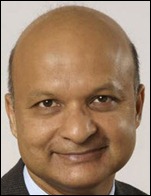I'd never heard of Healwell before and took a look over their offerings. Has anyone used the products? Beyond the…
News 5/13/11
![]() VA CIO Roger Baker, who advocates an open source approach, tells a House committee that replacement of its VistA system with commercial software would cost $16 billion. But in a good example of bad timing, the GAO says the VA’s historically weak project oversight caused a $127 million appointment scheduling application to fail.
VA CIO Roger Baker, who advocates an open source approach, tells a House committee that replacement of its VistA system with commercial software would cost $16 billion. But in a good example of bad timing, the GAO says the VA’s historically weak project oversight caused a $127 million appointment scheduling application to fail.
![]() From Court Jester: “Re: Society of Hospital Medicine. Here’s a picture of the action at the SHM meeting.” The action looks a bit light, but perhaps the picture is deceiving. SHM expected 2,500 physicians to attend the four-day event in Dallas.
From Court Jester: “Re: Society of Hospital Medicine. Here’s a picture of the action at the SHM meeting.” The action looks a bit light, but perhaps the picture is deceiving. SHM expected 2,500 physicians to attend the four-day event in Dallas.
![]() From Bmore: “Re: Johns Hopkins. I know they have an old version of Epic scheduling, but has Epic always been its own job category? Or is this a sign of something to come?” I’d speculate B, despite no announcement so far. One thing I’ve learned about Epic: there isn’t always that dramatic moment of taking the two vendors of choice down to one and then heading off for extended contract negotiations, followed by the big public lovefest. Somehow, everybody sees the Epic demos and just assumes it’s a done deal, often gearing up for the project even before a contract is signed. I thought Cerner’s Vision Center was the ultimate mass hypnosis selling machine until people started telling me about being bewitched by Epic, with any IT-advocated precautions thrown to the wind as the operational people salivate at kicking out the incumbent vendors at any price and maybe taking down what they see as an unresponsive IT department along the way. That may just be my inaccurate perception, so please weigh in if you’ve been run over by the Epic train at your place.
From Bmore: “Re: Johns Hopkins. I know they have an old version of Epic scheduling, but has Epic always been its own job category? Or is this a sign of something to come?” I’d speculate B, despite no announcement so far. One thing I’ve learned about Epic: there isn’t always that dramatic moment of taking the two vendors of choice down to one and then heading off for extended contract negotiations, followed by the big public lovefest. Somehow, everybody sees the Epic demos and just assumes it’s a done deal, often gearing up for the project even before a contract is signed. I thought Cerner’s Vision Center was the ultimate mass hypnosis selling machine until people started telling me about being bewitched by Epic, with any IT-advocated precautions thrown to the wind as the operational people salivate at kicking out the incumbent vendors at any price and maybe taking down what they see as an unresponsive IT department along the way. That may just be my inaccurate perception, so please weigh in if you’ve been run over by the Epic train at your place.
![]() From BadgerGrandma: “Re: Epic. A few weeks ago, attendees at Epic training were told that this was the biggest week ever, with over 1,000 people onsite for training.” It would be an interesting case study to review how formerly tiny, privately held Trojan horse Epic came late to the inpatient game, then in less than 10 years, totally ate the lunch of everybody in their target market of large academic medical centers. Cerner gets an occasional sale and Allscripts is doing recently better than Eclipsys did at selling Sunrise (which isn’t saying a whole lot), but that’s about it, at least unless the only hope of a worthy contender (Soarian) can move from nice idea to significant sales. It violates every economic principle that competitors haven’t developed something equivalent or superior to Epic without its high price. They’ve just handed the market over to Judy without a whimper, with customers happily plunking down dozens or hundreds of millions of dollars, in some cases replacing systems whose contract ink is barely dry.
From BadgerGrandma: “Re: Epic. A few weeks ago, attendees at Epic training were told that this was the biggest week ever, with over 1,000 people onsite for training.” It would be an interesting case study to review how formerly tiny, privately held Trojan horse Epic came late to the inpatient game, then in less than 10 years, totally ate the lunch of everybody in their target market of large academic medical centers. Cerner gets an occasional sale and Allscripts is doing recently better than Eclipsys did at selling Sunrise (which isn’t saying a whole lot), but that’s about it, at least unless the only hope of a worthy contender (Soarian) can move from nice idea to significant sales. It violates every economic principle that competitors haven’t developed something equivalent or superior to Epic without its high price. They’ve just handed the market over to Judy without a whimper, with customers happily plunking down dozens or hundreds of millions of dollars, in some cases replacing systems whose contract ink is barely dry.
![]() From Just a rumour: “Re: Epic. Heard that Lakeland in St. Joe, MI signed up. No reference on their site.” Unverified. Actually, I’ll call it verified since I found the item above in their physician newsletter.
From Just a rumour: “Re: Epic. Heard that Lakeland in St. Joe, MI signed up. No reference on their site.” Unverified. Actually, I’ll call it verified since I found the item above in their physician newsletter.
![]() From Rodeo: “Re: hospital hiring. Are they going crazy? I’ve had 10 calls and e-mails from recruiters who dug my resume out of the dungeon – it isn’t posted anywhere. Is May 1 a significant date?” My phone is ringing a lot too, and I dread new LinkedIn connection requests because they’re always from recruiters (my magnetism is apparently entirely occupational).
From Rodeo: “Re: hospital hiring. Are they going crazy? I’ve had 10 calls and e-mails from recruiters who dug my resume out of the dungeon – it isn’t posted anywhere. Is May 1 a significant date?” My phone is ringing a lot too, and I dread new LinkedIn connection requests because they’re always from recruiters (my magnetism is apparently entirely occupational).
![]() From Clyde Dale: “Re: Siemens. A. Gregory Sorensen, MD. Director, Center for Biomarkers in Imaging Associate Director, Martinos Center for Biomedical Imaging at Mass General. Going to Siemens to head up Med for US/ Canada.” Verified by Siemens.
From Clyde Dale: “Re: Siemens. A. Gregory Sorensen, MD. Director, Center for Biomarkers in Imaging Associate Director, Martinos Center for Biomedical Imaging at Mass General. Going to Siemens to head up Med for US/ Canada.” Verified by Siemens.
HIStalk Announcements and Requests

![]() Welcome to new HIStalk Platinum Sponsor Practice Fusion, vendor of the free, Web-based EHR that Brown-Wilson’s Black Book ranks as the #1 EHR product in customer satisfaction among primary care specialties. The company announced last month that its product is now used by 80,000 medical professionals managing 10 million patients, with another one million patients being added monthly. They say “Live in Five,” meaning users can start charting within five minutes of signing up, using the provided test data for practice if they want. Total cost is $0, which includes patient import, specialty modules, lab integration, scheduling, billing, a connected PHR, e-prescribing, and free unlimited US-based support. Thanks to Practice Fusion for supporting HIStalk.
Welcome to new HIStalk Platinum Sponsor Practice Fusion, vendor of the free, Web-based EHR that Brown-Wilson’s Black Book ranks as the #1 EHR product in customer satisfaction among primary care specialties. The company announced last month that its product is now used by 80,000 medical professionals managing 10 million patients, with another one million patients being added monthly. They say “Live in Five,” meaning users can start charting within five minutes of signing up, using the provided test data for practice if they want. Total cost is $0, which includes patient import, specialty modules, lab integration, scheduling, billing, a connected PHR, e-prescribing, and free unlimited US-based support. Thanks to Practice Fusion for supporting HIStalk.
Here’s a Practice Fusion video I found on YouTube, with a user (and Desert Storm veteran – thanks for your service, Doc) doing all the talking.
![]() I mentioned that I would be showcasing (at the suggestion of readers) small, innovative companies you might not hear about otherwise. Around 40 companies applied, my volunteer committee (provider, investment banker, financial services VP) chose nine to participate based on size and perceived level of innovation, and I have the first one nearly finished. The end result will be a company profile, interview, customer statement, and a pitch video. I was already overwhelmed, devoid of free time, and definitely not looking for new work, but this seems worthwhile.
I mentioned that I would be showcasing (at the suggestion of readers) small, innovative companies you might not hear about otherwise. Around 40 companies applied, my volunteer committee (provider, investment banker, financial services VP) chose nine to participate based on size and perceived level of innovation, and I have the first one nearly finished. The end result will be a company profile, interview, customer statement, and a pitch video. I was already overwhelmed, devoid of free time, and definitely not looking for new work, but this seems worthwhile.
![]() The things you do for love (of HIStalk, hopefully): (a) sign up for e-mail updates to your right, giving me direct access to your brain jack so I can project my electronic power of suggestion; (b) send me news, rumors, secret documents, comments, and guest articles; (c) connect with HIStalk, Inga, Dr. Jayne, and me on your favorite social not-work; (d) peruse with wide-eyed wonderment the mosaic of ads of sponsors who support the “HIT information wants to be free” concept by supporting my endless toil, and who would greatly appreciate in return clicks and/or consideration if you are in the market for that which they offer; and (e) beam occasional positive karma our way since we don’t go public with our fears, mistakes, and disappointments, but we’re loaded with them just like everybody else. And for you, a double-barrel index finger point (I’m thinking Isaac the bartender on Love Boat since I’ll be mentioning Doc down the page) — thanks for reading.
The things you do for love (of HIStalk, hopefully): (a) sign up for e-mail updates to your right, giving me direct access to your brain jack so I can project my electronic power of suggestion; (b) send me news, rumors, secret documents, comments, and guest articles; (c) connect with HIStalk, Inga, Dr. Jayne, and me on your favorite social not-work; (d) peruse with wide-eyed wonderment the mosaic of ads of sponsors who support the “HIT information wants to be free” concept by supporting my endless toil, and who would greatly appreciate in return clicks and/or consideration if you are in the market for that which they offer; and (e) beam occasional positive karma our way since we don’t go public with our fears, mistakes, and disappointments, but we’re loaded with them just like everybody else. And for you, a double-barrel index finger point (I’m thinking Isaac the bartender on Love Boat since I’ll be mentioning Doc down the page) — thanks for reading.
Acquisitions, Funding, Business, and Stock

Cerner will acquire Resource Systems, the 30-year-old Concord, OH company that sells CareTracker, an electronic documentation system for skilled nursing and assisted living facilities.
HCA launches Parallon Business Solutions, a business services subsidiary that will offer services for revenue cycle, workforce management, supply chain, and group purchasing.
Secure healthcare network vendor Ability Network (formerly VisionShare) closes on nearly $20 million venture capital, led by Lemhi Ventures and Bain Capital Ventures.
Cleveland Clinic spinoff Explorys closes $11.5 million in Series C financing. The company’s cloud computing data warehouse aggregates and curates EHR data from multiple systems to allow population analysis, with customers that include Cleveland Clinic, MedStar, Summa, and MetroHealth.
Sales
Anthelio Healthcare Solutions (formerly PHNS) contracts with MedQuist to implement its DocQment enterprise platform at eight of its client hospitals.
The New York City Health & Hospitals Corporation signs a five-year, $20 million support contract extension with QuadraMed for the QCPR inpatient clinical system.
GE Healthcare’s Health Systems division CEO Omar Ishrak is named chairman and CEO of Medtronic, replacing the retiring William A. Hawkins. He’ll be replaced at GE by Tom Gentile, moved over from GE Aviation. The division sells medical technology, such as CT, MR, life support systems, and home health. GE also announces that it has created a new business called Global Services that will take over GE Healthcare’s services strategy, to be led by North American services leader Mike Swinford.
Announcements and Implementations
![]() Business analytics software vendor SAS forms the SAS Center for Health Analytics and Insights, an internal incubator that will focus on applying analytics to patient data with the goal of improving healthcare quality and lowering cost. Areas of interest include evidence-based medicine and cost analysis. To which I’ll also add for you PR types: this is how press releases should be written — short, straightforward, chunked into easily readable paragraphs, and not turned into mind-numbing mush by overzealous, trademark symbol-wielding marketing people determined to collectively suck the life out of what started out as something interesting.
Business analytics software vendor SAS forms the SAS Center for Health Analytics and Insights, an internal incubator that will focus on applying analytics to patient data with the goal of improving healthcare quality and lowering cost. Areas of interest include evidence-based medicine and cost analysis. To which I’ll also add for you PR types: this is how press releases should be written — short, straightforward, chunked into easily readable paragraphs, and not turned into mind-numbing mush by overzealous, trademark symbol-wielding marketing people determined to collectively suck the life out of what started out as something interesting.
Corepoint Health’s integration engine receives ONC-ATCB Modular Ambulatory EHR and Modular Inpatient EHR certification.
![]() Crystal Cruises goes live with Emergisoft Maritime, an EHR specifically for cruise ship crew and guests. I’m picturing the sleazy, shorts-wearing Doc from Love Boat (c’mon, you know you want to sing it with me: “Loooove, exciiiiiiting and new …”) having even more time to letch around with bimbettes half his age, apparently unrestricted out there in international waters of any ethical or legal concerns that would prohibit him from putting his smoove moves on patients.
Crystal Cruises goes live with Emergisoft Maritime, an EHR specifically for cruise ship crew and guests. I’m picturing the sleazy, shorts-wearing Doc from Love Boat (c’mon, you know you want to sing it with me: “Loooove, exciiiiiiting and new …”) having even more time to letch around with bimbettes half his age, apparently unrestricted out there in international waters of any ethical or legal concerns that would prohibit him from putting his smoove moves on patients.
Government and Politics
![]() CHIME and AMGA announce their opposition to several provisions in the proposed ACO rule. CHIME objects to a privacy provision that would allow patients to opt out of data sharing while maintaining their ability to see primary care physicians within the ACO. It also takes issue with the requirement that 50% of an ACO’s primary care providers must meet MU standards by the ACO’s second year. Meanwhile, AMGA says 93% of its members would not enroll in an ACO based on the proposed framework, which AMGA considers “overly prescriptive, operationally burdensome.” Top concerns center around risk-sharing, static risk adjustment, retrospective attribution, quality measurement, and minimum savings.
CHIME and AMGA announce their opposition to several provisions in the proposed ACO rule. CHIME objects to a privacy provision that would allow patients to opt out of data sharing while maintaining their ability to see primary care physicians within the ACO. It also takes issue with the requirement that 50% of an ACO’s primary care providers must meet MU standards by the ACO’s second year. Meanwhile, AMGA says 93% of its members would not enroll in an ACO based on the proposed framework, which AMGA considers “overly prescriptive, operationally burdensome.” Top concerns center around risk-sharing, static risk adjustment, retrospective attribution, quality measurement, and minimum savings.
![]() In the UK, Prime Minister David Cameron says the government may cancel some or all of CSC’s $5 billion contract to install iSoft’s Lorenzo. CSC has been threatened previously for missing deadlines, and if it finally gets the boot, only BT will be left of the original four big contractors (Accenture and Fujitsu already bailed and were fired, respectively).
In the UK, Prime Minister David Cameron says the government may cancel some or all of CSC’s $5 billion contract to install iSoft’s Lorenzo. CSC has been threatened previously for missing deadlines, and if it finally gets the boot, only BT will be left of the original four big contractors (Accenture and Fujitsu already bailed and were fired, respectively).
Innovation and Research
A University of Arizona study finds that 72% of the software used by retail pharmacies in the state cannot detect all significant drug-drug interactions.
Other
Thirty-four percent of all office-based prescribers were using e-prescribing by the end of 2010. Cardiologists had the highest adoption rates (49%) followed by family physicians (47%.) Providers created 326 million e-prescriptions in 2010, up from 190 million in 2009.
The Triangle/Eastern NC Chapter for the Juvenile Diabetes Research Foundation recognizes Allscripts and EVP Diane K. Adams, who along with CEO Glen Tullman, has family members with juvenile diabetes. Allscripts has contributed over $1 million to JDRF since 2004.
![]() Weird News Andy celebrates what he calls “the breast app ever!” A plastic surgeon develops an app that uses 3D imaging to allow prospective breast implantees to visualize their new protuberances, followed by easy posting of the “check these out” pictures directly to Facebook so that cyber-acquaintances, business associates, and elementary school aged nieces and nephews can weigh in on the proposed alterations.
Weird News Andy celebrates what he calls “the breast app ever!” A plastic surgeon develops an app that uses 3D imaging to allow prospective breast implantees to visualize their new protuberances, followed by easy posting of the “check these out” pictures directly to Facebook so that cyber-acquaintances, business associates, and elementary school aged nieces and nephews can weigh in on the proposed alterations.
This came in my work e-mail from some vendor. Somehow I don’t have a lot of confidence in their “HIPPA” wisdom.
![]() SCI Solutions provides laptops and cash donations from its employees to a project run by some surfer buds (one of them SCI SVP Vinnie Whibbs) and some non-profits to provide resources to students and for community projects at Playa Gigante, Nicaragua.
SCI Solutions provides laptops and cash donations from its employees to a project run by some surfer buds (one of them SCI SVP Vinnie Whibbs) and some non-profits to provide resources to students and for community projects at Playa Gigante, Nicaragua.
![]() The LBJ School of Public Affairs and the Patient Privacy Rights Foundation will hold the one-day Health Privacy Summit: Getting IT Right: Protecting Patient Privacy in a Wired World on June 13 in Washington, DC, a public forum to address health privacy. Speakers include quite a few folks from government and academia, along with HIT-recognizable names Barry Chaiken (former HIMSS board chair and Imprivata CMO), Mark Frisse (Vanderbilt), Deborah Peel MD (founder, Patient Privacy Rights), Joy Pritts (chief privacy officer, ONC), Michael Stearns (president and CEO, e-MDs), and Latanya Sweeney (the Carnegie Mellon professor who proved that it’s not that hard to re-identify de-identified data when you match it up to a second database). Registration is $100 general, $75 government or academic, and $50 for students. I’d go if it wasn’t tough to get time off from work on relatively short notice, so if you’re attending and want to report from there, do it.
The LBJ School of Public Affairs and the Patient Privacy Rights Foundation will hold the one-day Health Privacy Summit: Getting IT Right: Protecting Patient Privacy in a Wired World on June 13 in Washington, DC, a public forum to address health privacy. Speakers include quite a few folks from government and academia, along with HIT-recognizable names Barry Chaiken (former HIMSS board chair and Imprivata CMO), Mark Frisse (Vanderbilt), Deborah Peel MD (founder, Patient Privacy Rights), Joy Pritts (chief privacy officer, ONC), Michael Stearns (president and CEO, e-MDs), and Latanya Sweeney (the Carnegie Mellon professor who proved that it’s not that hard to re-identify de-identified data when you match it up to a second database). Registration is $100 general, $75 government or academic, and $50 for students. I’d go if it wasn’t tough to get time off from work on relatively short notice, so if you’re attending and want to report from there, do it.
![]() A coroner in Australia rules that a woman’s death after gall bladder surgery was due to medical error. Her gall bladder had been removed 10 years before, but radiology staff misidentified intestinal gas bubbles, the surgeon overlooked the medical history entry about her previous surgery, and everybody noticed but nobody questioned the scar on her abdomen. She died of post-surgical sepsis. Her granddaughter says she hopes the medical system will change so that clinical documentation is shared among physician practices and hospitals.
A coroner in Australia rules that a woman’s death after gall bladder surgery was due to medical error. Her gall bladder had been removed 10 years before, but radiology staff misidentified intestinal gas bubbles, the surgeon overlooked the medical history entry about her previous surgery, and everybody noticed but nobody questioned the scar on her abdomen. She died of post-surgical sepsis. Her granddaughter says she hopes the medical system will change so that clinical documentation is shared among physician practices and hospitals.
Sponsor Updates
- Onze Lieve Vrouwe Gasthuis hospital in Amsterdam deploys iMDsoft’s MetaVision to provide tele-intensivist monitoring.
- Moore Regional Hospital (NC) picks ProVation MD for gastroenterology procedure documentation and coding.
- CareTech Solutions launches iDoc Savings Calculator, which estimates savings from implementing its iDoc document imaging and management product.
- Universal American Corp., a Medicare health benefits company, collaborates with NextGen to offer participating physicians access to NextGen’s EHR in multiple markets
- The Texas e-Health Alliance appoints ICA CEO Gary Zegiestowsky to its board.
- The Centre hospitalier Pierre-Janet in Quebec adopts the Vocera voice communication system.
- DIVURGENT announces new hires: Matt Curtain (client services VP), Sarah Rourke (recruiter), and Christina Pena Jones, DHA, (nurse educator).
- Nashville-based iPractice Group will resell Greenway’s PrimeSUITE.
EPtalk by Dr. Jayne
The Centers for Medicare and Medicaid Services (CMS) recently launched the first phase of its Physician Compare Web site, which is supposed to display physician address information, medical education, credentials, gender, etc. as well as whether physicians reported quality data to CMS.
Like any good Internet junkie, I of course had to search myself. Not surprisingly, my listing has errors, as does the listing which appears below mine alphabetically (it happens to be a former colleague of mine whose details I know as well as my own).
My listing includes a practice address where I haven’t provided patient care for more than four years, as well as practices where I have never provided care. There’s even a location listed for me that belongs to a practice that used to be owned by my group, but was sold more than a year ago.
This does not give me great comfort in the skills of CMS to accurately portray my ability to report quality data (especially since they can’t accurately portray my address). Phase Two of the site will launch later this year and identify whether physicians are e-prescribing or not. Quality data will be available by 2013. I hope in that time frame they can figure out where I practice.
Speaking of government, for those of you who missed it, Newt Gingrich is officially seeking the Republican nomination for President. Gingrich has been dabbling in the healthcare space for some time, largely through his for-profit Center for Health Transformation (CHT), so this should be interesting.
CHT has a white paper about Accountable Care Organizations that features some well-known examples of ACO-type organizations. It’s pretty basic, but a decent read for those that need a quick study of ACO 101.
Newt’s proposed healthcare reforms are detailed on his Web site and include rewarding quality care, incentivizing health behaviors, stopping fraud, and educating patients on price and quality. For those of us in healthcare IT, the good times will continue to roll as there is more and more focus on data mining to support these efforts.
By the time the 2012 election rolls around, I’ll be sick and tired of the politics along with everyone else. On the other hand, I won’t have to worry about having enough material for HIStalk. Round and round health reform goes; where it stops, nobody knows!

Contacts
Mr. H, Inga, Dr. Jayne, Dr. Gregg.












Your comments imply that Epic is the only company making hospital sales. Don’t forget about Meditech, whose customers are less well known. Meditech is very quietly selling many systems and is extraordinarily successful.
[From Mr. H] I qualified my statements specifically as being “in their target market of large academic medical centers.” I doubt there are many (any?) cases where Epic and Meditech compete for a deal.
Regarding your comment on HIPPA, it irks me to no end when a consulting company wants to sell me their HIPPA expertise. It is quite obvious they do not have any expertise.
Maybe Epic’s success is not so hard to explain in economic terms – customer-driven capitalism.
http://hbr.org/2010/01/the-age-of-customer-capitalism/ar/1 (full article requires subscription)
http://hbr.org/2010/01/the-age-of-customer-capitalism/ib (short summary)
Epic Judy – CEOs , CFOs and Board Members like to hear from CEOs. They don’t want PowerPoints, canned demos, etc. They want one-to-one, direct communication about the facility or IDN challenges, plans, and goals — and how a vendor is going to solve them over the facility’s long planning horizon. The C-suite to C-suite selling process eliminates time, wasted effort, and concern over building collaboration with lower-levels. It also helps when you have a CEO who is ‘good-with-people’.
It’s a brilliant sales model that saves a great deal of time and hurt feelings in the process, since line and staff don’t know what was going on in the C-suite until it’s all over. I’ve worked for 3 majors where CEOs would just make the hospital C-suite uneasy in most situations – – “If you don’t buy our solution, I’ll make sure you’re fired” is not a great closing technique.
If you count the number of postings on this site alone that mention EPIC vs. the mentioning of all the other HIS vendors, it is easy to see why the EPIC name just keeps growing and growing. Much like the “cults” from the 70s: Everyone is joining so it must be good (or God). Those of us who have been in the healthcare business for a long period of time are just sitting back and watching, waiting for the slide down the back side of the bell curve to begin. It doesn’t matter what HIS vendor you use, they all have their problems. Not one of them offers everything you need, at a reasonable price without the experience of jumping through hoops to obtain and maintain high quality output. It is the challenge us Healthcare IT folks live with every single day. ALL HAIL EPIC, MCKESSON, MEDITECH, CERNER, SIEMENS and every one else!!!!
I can verify that Lakeland in St. Joe, MI signed with Epic. I was part of the advisory team that helped with selection of Epic and negotiation of the agreement.
$127 million for an Outpatient Scheduling system…that never worked ??? Outpatient scheduling systems have been available in the commercial market for at least 20 years and offered by well over 400 vendors. Unfortunately, today is payday and I will be forced to notice how much was deducted from my check in taxes to pay for foolishness such as this !!!
It’s interesting that Cardiologists lead the pack in e-prescribing adoption. Does anyone have any theories about why that specialty would lead the way?
(also, the e-prescribing link is broken for me, you might want to check whether it’s functional)
[From Inga:] Link fixed – thanks. As to why cardiologists lead the pack, here are a couple of my thoughts. First, cardiologists prescribe a narrower list of drugs than some other specialties, so the e-prescribing process is faster. Cardiologists also do more refills of the same meds. Refills are easy complete with e-prescribing. Most cardiology patients are on some sort of medication, which is not the case in all specialties. Cardiologists also tend to see a high-volume of patients when they are in the office and e-prescribing is a relatively easy tool that also increases office efficiency.
Re: Epic and Meditech rarely competing.
HCA recently did trials with Cerner, Epic, and Meditech’s new system in some of their hospitals. Thoughts on how this might play out?
Re: recruiters and LinkedIn, I know it’s a bit of a hassle to deal with these approaches, but count your blessings. The national unemployment rate is 8.7%. I’m happy we’re not part of that stat.
[From Mr. H] A great point! It’s better than trudging all over town filling out applications day after day and hearing nothing back.
SAS Announcement:
Thanks for the PR tip. You’re right, the SAS release format is great. Us PR folks are always trying to get it right and we appreciate your advice. Thanks!
RE: What the GAO found: “The application software project was hindered by weaknesses in several key management disciplines, including acquisition planning, requirements analysis, testing, progress reporting, risk management, and oversight.”
In other words, they screwed up the whole darn thing. Doesn’t give you a lot of warm fuzzies about Healthcare reform, does it??
I think the 179M for a VA failed scheduling project is an important factor in thinking through the VA’s request to do even more self development (even if under the banner of Open Source, it is important to remember that Vista already was Open Source).
What ever you call it, if it is 95% funded by tax dollars, it isn’t Open Source, it is Tax Funded Self Development software.
The likelihood of success in the futuer for any endeavor is best understood by looking at the organizations history.
To allow the VA to continue down this path may be a great federal jobs program, but definitely not a likely to turn out to be an efficient use of tax payer dollars.
It’s easy to criticize the VA based on that bit of information above, but give them credit for what they’ve done. They still have the best HIS system out there, even better than Epic (gasp!, I know). Keep in mind the only reason you know about it is the transparency of the government. Ask Epic how much they spent on Beaker and OpTime, both of which have been flops. You can’t get that info or any other because they’re private with no transparency. Just because Judy’s a marketing machine who can charm hospital CFOs into writing massive checks doesn’t mean she’s really willing to speak truth to hospital administrators. It’s nice that the CEO jumps in her private jet to fly around the country and tell hospital CEOs how great it is to pour $100 million into a semi-decent piece of software just so their CIOs can go home early and their physicians and nurses can revel in quaint little “workflows” that don’t really actually do anything to improve the current health care system. I’ll tell you the real reason clinicians love Epic: it allows them to do exactly what they’re used to, with a little automation thrown in to improve some processes, without actually improving the quality of their care beyond that basic automation piece. It’s a dream come true for docs who don’t want to adapt to a changing health care environment. I’d love for HISTalk to post average ROI v. TCO for each HIS out there and see which one is actually the most cost effective. I suspect Epic will come in last place among the major hospital vendors. It’s especially comical when Epic reps run around to hospitals talking about how Epic can make them an ACO just because Kaiser and Geisinger use it. Those health systems are moving towards becoming ACOs in spite of Epic, not because of it. If Judy gets her way Epic will stall health care reform for a decade while they try to figure out what the real point of a HIS is.
I need a little basic background – can someone explain why the VA is looking at replacing VistA? It seems to be working very well. At least, the physicians that I know don’t seem to have major complaints. What’s the driver for replacing it instead of making incremental improvements?
Dear Slightly Tired: Yes, I have a theory. Most patients are given drugs to feel better. Cardiology patients are given drugs to avoid dying suddenly. Focuses the mind.
We do not wish to miss the bus and really would like to help, as there appears to be an exceptional demand for skilled labor.
How come no one ever contacted us and we are really looking actively.
Where is a good place to upload resume. We tried Dice..however that got us no response. Where is a good place to find recruiters in Health IT.
-Overseas hopeful..